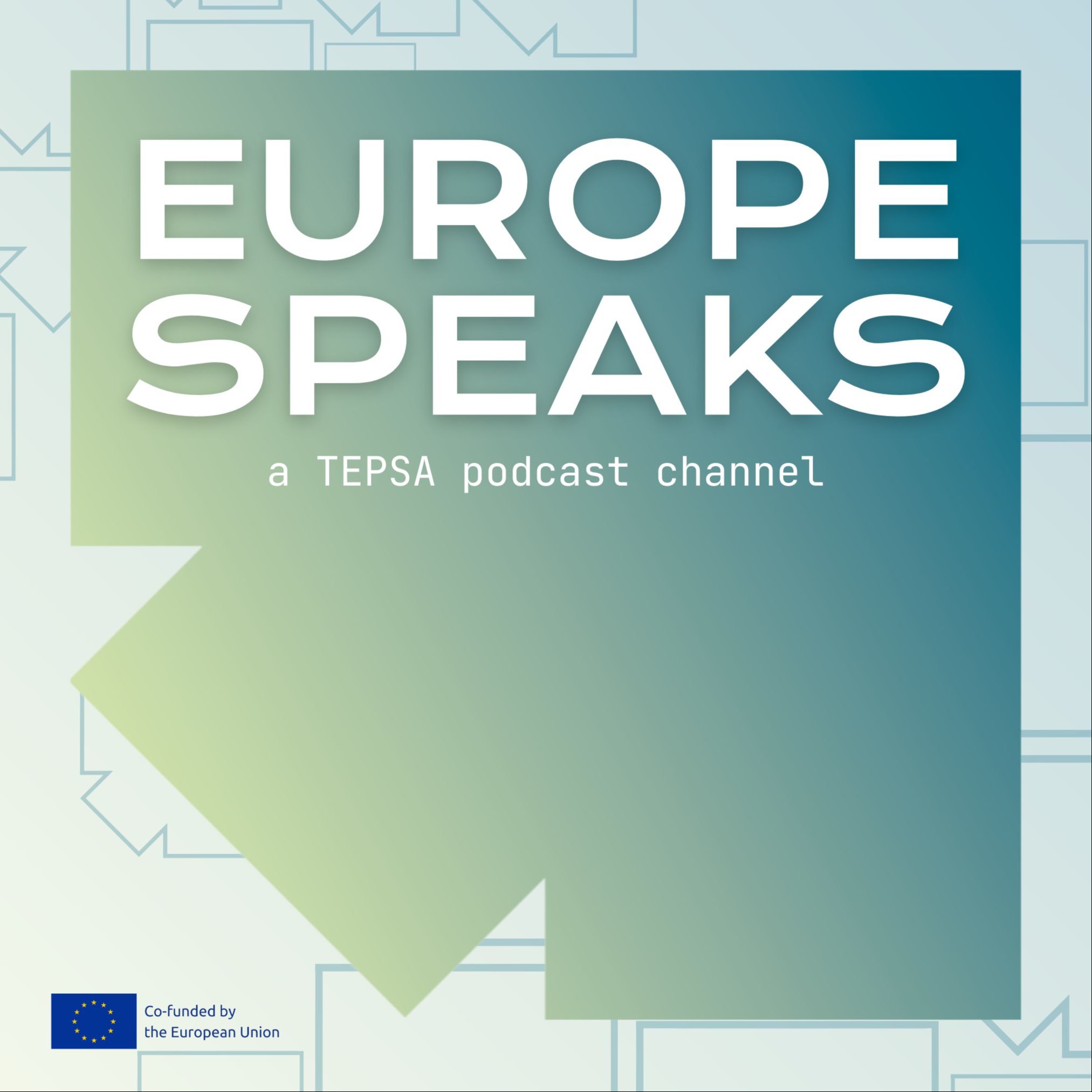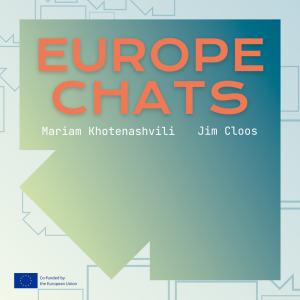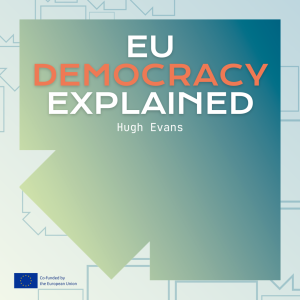
Welcome to ‘Europe Speaks’, a podcast channel by the Trans European Policy Studies Association (TEPSA) where we explore everything to do with the European Union: history, current affairs, and the future of Europe. We publish regular podcasts on all these topics, including EuropeChats with Jim Cloos and Mariam Khotenashvili, and a series of other webinars, explainers, and interviews with the world’s leading experts on the EU!
Episodes

Thursday Jul 04, 2024
Thursday Jul 04, 2024
This episode of EuropeChats is a discussion between Enrico Letta, former Italian Prime Minister and President of the Institut Jacques Delors, and TEPSA Secretary-General Jim Cloos. The discussion follows our series of interviews with former members of the European Council to mark the 50th anniversary of the institution, but also focuses on Mr. Letta's vision for the future of the European project, based on his recent report "Much more than a market".
This episode is a discussion with Enrico Letta . Enrico Letta is President of the Jacques Delors Institut, Dean of the School of International Affairs at Sciences Po Paris (PSIA) and former Italian Prime Minister. He has also been a Member of the Chamber of Deputies between 2006 and 2015. Letta was Minister of European Affairs from 1998 to 1999 and Minister of Industry from 1999 to 2001, and served as Secretary to the Council of Ministers from 2006 to 2008. He is a founding member of the Democratic Party.
EuropeChats is the flagship podcast of TEPSA and it is part of the TEPSA Podcast Channel “Europe Speaks”
Music: Worakls, 22 September 2014, Salzburg, Hungry music
This video is co-funded by the Citizens, Equality, Rights and Values programme of the European Union
Co-Funded by the European Union.

Thursday Jun 06, 2024
EuropeChats – EU Enlargement, Democracy, and Security| Discussion with Erik Jones
Thursday Jun 06, 2024
Thursday Jun 06, 2024
This episode of EuropeChats is a discussion between Prof. Erik Jones, Director of the Robert Schuman Centre for Advanced Studies at the European University Institute, and TEPSA Executive Director Mariam Khotenashvili. The discussion focuses on EU enlargement - but from a different angle than usual: people, not just institutions; firms, not just nation states; and also the security foundations of EU enlargement.
With the accession agenda firmly in the foreground of European politics once again, thanks to recent decisions to start accession negotiations with Ukraine and Moldova (agreed in December 2023 European Council) as well as with Bosnia and Herzegovina (agreed in the March 2024 European Council), it is more crucial than ever to explore the ins and outs of enlargement policy, and discuss the ways forward for EU candidate countries.
In particular, the discussion focuses on topics such as the de facto enlargement of the EU resulting from the influx of millions of people from the Western Balkans or Ukraine, as well as the business ties already established between the EU and candidate countries, in addition to topics like how to maintain the rule of law in an enlarged Union, and how to build democratic resilience.
This episode is a discussion with Prof. Erik Jones. Erik Jones is Director of the Robert Schuman Centre for Advanced Studies at the European University Institute and author, editor, or co-editor of books and special issues of journals on topics related to European politics and political economy. Professor Jones is co-editor of Government & Opposition and a contributing editor of Survival. His commentary has appeared in the Financial Times, the New York Times, and other major newspapers and magazines across Europe and North America.
EuropeChats is the flagship podcast of TEPSA and it is part of the TEPSA Podcast Channel “Europe Speaks”
Music: Worakls, 22 September 2014, Salzburg, Hungry music
This video is co-funded by the Citizens, Equality, Rights and Values programme of the European Union
Co-Funded by the European Union.
![EuropeChats – Le Conseil Européen du point de vue d'un Président de la Commission [FRANÇAIS] | Discussion with Jacques Santer](https://pbcdn1.podbean.com/imglogo/ep-logo/pbblog11377003/2_r5aua3_300x300.png)
Monday May 27, 2024
Monday May 27, 2024
This episode of EuropeChats takes place in French.
Cet épisode d'EuropeChats s'inscrit dans le cadre des activités variés de TEPSA sur le sujet des cinquantième anniversaire du Conseil Européen. Jim Cloos, Secrétaire Général de TEPSA, s'est rendu au Luxembourg pour parler avec l'ancien Président de la Commission Européenne Jacques Santer.
Le Président Santer a été Premier Ministre du Luxembourg entre 1984 et 1995, et Président de la Commission entre 1995 et 1999. Pendant son mandat à la Commission, Jim était son Chef de Cabinet.
Leur entretien porte sur les expériences de Monsieur Santer au sein du Conseil Européen en tante que Premier Ministre aussi qu'en temps que Président de la Commission. Cette discussion constitue une ressource importante d'une vie politique Européenne.
EuropeChats is the flagship podcast of TEPSA and it is part of the TEPSA Podcast Channel “Europe Speaks”
Music: Worakls, 22 September 2014, Salzburg, Hungry music
This video is co-funded by the Citizens, Equality, Rights and Values programme of the European Union
Co-Funded by the European Union.

Thursday Apr 18, 2024
Thursday Apr 18, 2024
This episode of EuropeChats is the second in our two-part discussion with former Belgian Prime Minister and first permanent President of the European Council, Herman Van Rompuy. In the first part, TEPSA Secretary-General Jim Cloos sat down with President Van Rompuy to discuss his experience and working practices in the EUCO; in this part, they discuss the main policy priorities he had to face during his tenure as President between 2009-2014.
President Van Rompuy has experienced different iterations of the European Council from different perspectives: he first joined the club as Belgian Prime Minister before the Lisbon Treaty entered into force and where Foreign Ministers where thus still taking part in the meetings. Then, when he became the Institution's first permanent President, he held the position in the iteration of the EUCO currently extant in the Treaties. All of this at a time where the EU's early 21st century so-called 'perma-crisis' was gathering momentum, with the fallout of the 2008 Global Financial Crisis continuing into the 2010s, and the early days of the Refugee Crisis coming to the fore towards the end of his tenure.
This episode is a discussion with Herman Van Rompuy. President Van Rompuy was Prime Minister of Belgium from 2008-2009, President of the European Council 2009-2014, and is Honorary President of the European Policy Centre.
EuropeChats is the flagship podcast of TEPSA and it is part of the TEPSA Podcast Channel “Europe Speaks”
Music: Worakls, 22 September 2014, Salzburg, Hungry music
This video is co-funded by the Citizens, Equality, Rights and Values programme of the European Union
Co-Funded by the European Union.

Thursday Apr 18, 2024
Thursday Apr 18, 2024
This episode of EuropeChats is the first in a number of discussions both within and outside of the EuropeChats series that TEPSA and its Member Institutes are conducting to mark the fiftieth anniversary of the European Council. In this discussion, TEPSA Secretary-General Jim Cloos sits down with former Belgian Prime Minister and the first ever permanent President of the European Council: Herman Van Rompuy.
President Van Rompuy has experiences different iterations of the European Council from different perspectives: he first joined the club as Belgian Prime Minister before the Lisbon Treaty entered into force and where Foreign Ministers where thus still taking part in the meetings. Then, when he became the Institution's first permanent President, he held the position in the iteration of the EUCO currently extant in the Treaties. All of this at a time where the EU's early 21st century so-called 'perma-crisis' was gathering momentum, with the fallout of the 2008 Global Financial Crisis continuing into the 2010s, and the early days of the Refugee Crisis coming to the fore towards the end of his tenure.
This episode is a discussion with Herman Van Rompuy. President Van Rompuy was Prime Minister of Belgium from 2008-2009, President of the European Council 2009-2014, and is Honorary President of the European Policy Centre. EuropeChats is the flagship podcast of TEPSA and it is part of the TEPSA Podcast Channel “Europe Speaks”
Music: Worakls, 22 September 2014, Salzburg, Hungry music
This video is co-funded by the Citizens, Equality, Rights and Values programme of the European Union
Co-Funded by the European Union.

Friday Apr 05, 2024
Friday Apr 05, 2024
This episode of EuropeChats is a discussion between Gert Jan Koopman, Director-General of the Directorate-General for Neighbourhood and Enlargement Negotiations (DG NEAR), and TEPSA Executive Director Mariam Khotenashvili. The discussion focuses on the current prospect of the EU enlargement file. With the accession agenda firmly in the foreground of European politics once again, thanks to recent decisions to start accession negotiations with Ukraine and Moldova (agreed in December 2023 European Council) as well as with Bosnia and Herzegovina (agreed in the March 2024 European Council), it is more crucial than ever to explore the ins and outs of enlargement policy, and discuss the ways forward for EU candidate countries.
In particular, the discussion focuses on topics such as the 50 billion euro Ukraine Facility as well as the 6 billion euro Reform and Growth Facility for the Western Balkans. In addition, Mariam and Gert Jan cover difficult issues such as citizens' (particularly farmers') concerns about the effects of Ukrainian grain exports on the EU's internal market and competitiveness, and a climate of disinformation surrounding the future accession of candidate countries.
This episode is a discussion with Gert Jan Koopman. Gert Jan is the Director-General of DG NEAR, with an ambitious agenda for strengthening integration between the EU and its neighbours. He has also previous worked on economy and competition policies and was in charge of the EU budget.
EuropeChats is the flagship podcast of TEPSA and it is part of the TEPSA Podcast Channel “Europe Speaks”
Music: Worakls, 22 September 2014, Salzburg, Hungry music
This video is co-funded by the Citizens, Equality, Rights and Values programme of the European Union
Co-Funded by the European Union.

Tuesday Dec 19, 2023
EU Democracy Explained – Is the EU Democratic? Part 3 – the European Parliament
Tuesday Dec 19, 2023
Tuesday Dec 19, 2023
In this series from the Trans European Policy Studies Association (TEPSA), Hugh Evans explores the ways democracy weaves its way in and out of the EU system.
This episode tackles the institution that you might already be most familiar with: the European Parliament. We will learn about its history dating all the way back to the 1950s and about what developments over the course of that period have served to increase the quality of representation, accountability, and ultimately democracy within it. We will also tackle a crucial concept in democracy theory: representation. While you might think you already know about this concept, there is more to the theory of representation than you might think, and its nuanced and vital role in democracy is implemented in a unique way in the EU system,
EU Democracy Explained is a series where we delve into detail about what democracy actually is and how it works in Europe, and ask ourselves: “what makes the EU democratic?”
Script, Recording & Editing: Hugh Evans
Music: Wondershare Filmora X.
Co-funded by the European Union. Views and opinions expressed are however those of the author(s) only and do not necessarily reflect those of the European Union or European Education and Culture Executive Agency (EACEA). Neither the European Union nor the granting authority can be held responsible for them.

Monday Dec 18, 2023
Monday Dec 18, 2023
O’Sullivan
This episode of EuropeChats is a discussion on the implementation and effectiveness of EU sanctions against third countries, with a particular focus on Russia. TEPSA Secretary-General Jim Cloos is joined by EU Sanctions Envoy David O'Sullivan and a leading expert on sanctions, Dr Clara Portela from the University of Valencia. Sanctions are a key tool in the EU's external policy, and can be employed in a variety of ways and with a variety of possible aims and outcomes.
The most recent high-profile occasions in which the EU has chosen to impose sanctions on a third country is in a series of sanctions packages preceding and in the aftermath of Russia's aggression of Ukraine, which started in February 2022. Throughout the ensuing war, the EU has continued to ramp up its sanctions measures, and this episode discusses their implementation and effectiveness.
EuropeChats is the flagship podcast of TEPSA and it is part of the TEPSA Podcast Channel “Europe Speaks”
Music: Worakls, 22 September 2014, Salzburg, Hungry music
This video is co-funded by the Citizens, Equality, Rights and Values programme of the European Union
Co-Funded by the European Union.

Friday Dec 15, 2023
Friday Dec 15, 2023
In this series from the Trans European Policy Studies Association (TEPSA), Hugh Evans explores the ways democracy weaves its way in and out of the EU system.
This episode revolves around one of the institutions in the EU triangle that represents one of the two poles of the EU’s dual legitimacy: the Council of the European Union – legitimacy via the 27 governments. We will explore its makeup, its role and internal functioning, and we’ll discover what its crucial role in the legislative process might mean in terms of defining what the EU actually is.
In addition, we will learn about the complex academic debate surrounding the question of defining the EU as an entity. In exploring different theories of European integration and functioning, we will discover what aspects of the system conform to the various theories.
EU Democracy Explained is a series where we delve into detail about what democracy actually is and how it works in Europe, and ask ourselves: “what makes the EU democratic?”
Script, Recording & Editing: Hugh Evans
Music: Wondershare Filmora X
Co-funded by the European Union. Views and opinions expressed are however those of the author(s) only and do not necessarily reflect those of the European Union or European Education and Culture Executive Agency (EACEA). Neither the European Union nor the granting authority can be held responsible for them.

Friday Dec 08, 2023
Friday Dec 08, 2023
This episode of EuropeChats is a discussion on a crucial question for the EU in 2024: what will the next Strategic Agenda look like?.
Every five years, EU leaders agree on the EU's political priorities for the future. It is a collective effort led by the President of the European Council, where leaders discuss and decide together. It takes place in the context of the European Parliament elections and ahead of the appointment of each European Commission.
Given the way Belgium has chosen to structure its Presidency of the Council of the European Union for the first half of 2024, the 6 months immediately preceding the finalisation of the Strategic Agenda, such that its second half can be dedicated to supporting the formulation of that Agenda, TEPSA Secretary-General Jim Cloos speaks with Wouter Detavernier, who is the Deputy Directory-General for European Affairs and Coordination at the Belgian Ministry of Foreign Affairs. Richard Youngs, Senior Fellow at Carnegie Europe and TEPSA Board Member, joins the discussion too, in order to give his expert insights as a researcher.
EuropeChats is the flagship podcast of TEPSA and it is part of the TEPSA Podcast Channel “Europe Speaks”
Music: Worakls, 22 September 2014, Salzburg, Hungry music
This video is co-funded by the Citizens, Equality, Rights and Values programme of the European Union
Co-Funded by the European Union.
